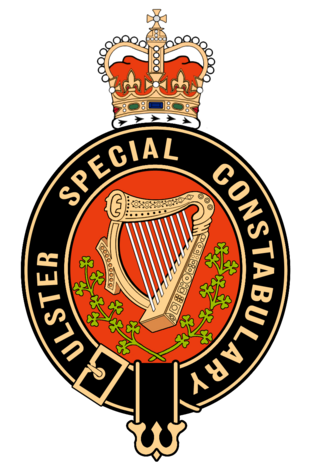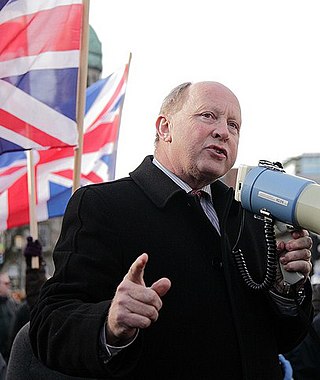
The Royal Ulster Constabulary (RUC) was the police force in Northern Ireland from 1922 to 2001. It was founded on 1 June 1922 as a successor to the Royal Irish Constabulary (RIC) following the partition of Ireland. At its peak the force had around 8,500 officers, with a further 4,500 who were members of the RUC Reserve.

Ian Richard Kyle Paisley, Baron Bannside, was a loyalist politician and Protestant religious leader from Northern Ireland who served as leader of the Democratic Unionist Party (DUP) from 1971 to 2008 and First Minister of Northern Ireland from 2007 to 2008.

The Anglo-Irish Agreement was a 1985 treaty between the United Kingdom and the Republic of Ireland which aimed to help bring an end to the Troubles in Northern Ireland. The treaty gave the Irish government an advisory role in Northern Ireland's government while confirming that there would be no change in the constitutional position of Northern Ireland unless a majority of its citizens agreed to join the Republic. It also set out conditions for the establishment of a devolved consensus government in the region.

The Ulster Special Constabulary was a quasi-military reserve special constable police force in what would later become Northern Ireland. It was set up in October 1920, shortly before the partition of Ireland. The USC was an armed corps, organised partially on military lines and called out in times of emergency, such as war or insurgency. It performed this role most notably in the early 1920s during the Irish War of Independence and the 1956-1962 IRA Border Campaign.

Robert Thomas William McCrea, Baron McCrea of Magherafelt and Cookstown is a Democratic Unionist Party (DUP) politician, Christian singer and retired Free Presbyterian minister from Northern Ireland. As a politician, he represented South Antrim and Mid Ulster as their Member of Parliament (MP), representing Mid Ulster from 1983 to 1997; then South Antrim between 2000 and 2001, and then again from 2005 to 2015.

James Hugh Allister is a British Unionist politician and barrister in Northern Ireland. He founded the Traditional Unionist Voice (TUV) political party in 2007, leading the party since its formation. Allister has served as a Member of the Northern Ireland Assembly (MLA) for North Antrim since 2011, and is the TUV’s only representative in the Assembly.
The Ulster Protestant Volunteers was a loyalist and Reformed fundamentalist paramilitary group in Northern Ireland. They were active between 1966 and 1969 and closely linked to the Ulster Constitution Defence Committee (UCDC) and Ulster Volunteer Force (UVF), established by Ian Paisley and Noel Doherty in 1966.
The Ulster Constitution Defence Committee (UCDC) was established in Northern Ireland in April 1966 as the governing body of the loyalist Ulster Protestant Volunteers (UPV). It coordinated parades, counter demonstrations and paramilitary activities in order to maintain the status quo of the government, lead a campaign against the reforms of Terence O'Neill and stymie the civil rights movement.
The Ulster Clubs was the name given to a network of Unionist organisations founded in Northern Ireland in November 1985. Emerging from an earlier group based in Portadown, the Ulster Clubs briefly mobilised wide support across Northern Ireland and sought to coordinate opposition to the development of closer relations between the governments of the United Kingdom and Ireland. The group's motto was "hope for the best and prepare for the worst".
The Northern Ireland flags issue is one that divides the population along sectarian lines. Depending on political allegiance, people identify with differing flags and symbols, some of which have, or have had, official status in Northern Ireland.

Ulster Resistance (UR), or the Ulster Resistance Movement (URM), is an Ulster loyalist paramilitary movement established by the Democratic Unionist Party (DUP) in Northern Ireland in November 1986 in opposition to the Anglo-Irish Agreement.

William McCaughey was a member of the Royal Ulster Constabulary's Special Patrol Group and the illegal Ulster Volunteer Force's Glennane gang in the 1970s. He was imprisoned for 16 years for murder from 1980 to 1996. On his release he worked as a loyalist and Orange Order activist until his death in 2006.
The Reavey and O'Dowd killings were two coordinated gun attacks on 4 January 1976 in County Armagh, Northern Ireland. Six Catholic civilians died after members of the Ulster Volunteer Force (UVF), an Ulster loyalist paramilitary group, broke into their homes and shot them. Three members of the Reavey family were shot at their home in Whitecross and four members of the O'Dowd family were shot at their home in Ballydougan. Two of the Reaveys and three of the O'Dowds were killed outright, with the third Reavey victim dying of brain haemorrhage almost a month later.

Gerard Casey was a member of the 1st North Antrim Brigade of the Provisional Irish Republican Army.
Burntollet Bridge was the setting for an attack on 4 January 1969 during the first stages of the Troubles of Northern Ireland. A People's Democracy march from Belfast to Derry was attacked by Ulster loyalists whilst passing through Burntollet.
Down Orange Welfare was an Ulster loyalist paramilitary vigilante group active in Northern Ireland during the 1970s. Operating in rural areas of County Down, the group faded after failing to win support away from larger groups such as the Ulster Defence Association (UDA) and Ulster Volunteer Force (UVF).
John "Bunter" Graham is a long-standing prominent Ulster loyalist figure. Born in the Lower Shankill, Graham rose quickly through the ranks of the Ulster Volunteer Force (UVF), joining other UVF leaders at a rally at Stormont in 1974 to celebrate the collapse of power sharing.
The Ulster Service Corps (USC) was a loyalist vigilante group with a paramilitary structure active in Northern Ireland in the late 1970s. Although short-lived it briefly had a sizeable membership. One of a number of small independent loyalist paramilitary groups active in the mid 1970s, alongside the Orange Volunteers, Ulster Volunteer Service Corps, Down Orange Welfare and the Ulster Special Constabulary Association (USCA), the USC was the largest of these minor groups.
The Ulster Volunteer Service Corps (UVSC) was an Ulster loyalist vigilante and paramilitary movement active in Northern Ireland during the early 1970s. Initially the steward group for the Ulster Vanguard, under the title Vanguard Service Corps, it continued to exist after becoming independent of that movement.
The Clontibret invasion was an incursion by Ulster loyalists into the small Monaghan village of Clontibret, in the Republic of Ireland, on 7 August 1986. After crossing the border the loyalists proceeded to vandalise many buildings in the village and attacked two police officers before being dispersed by the Garda Síochána. The incident occurred in the context of unionist opposition to the recently signed Anglo-Irish Agreement.









